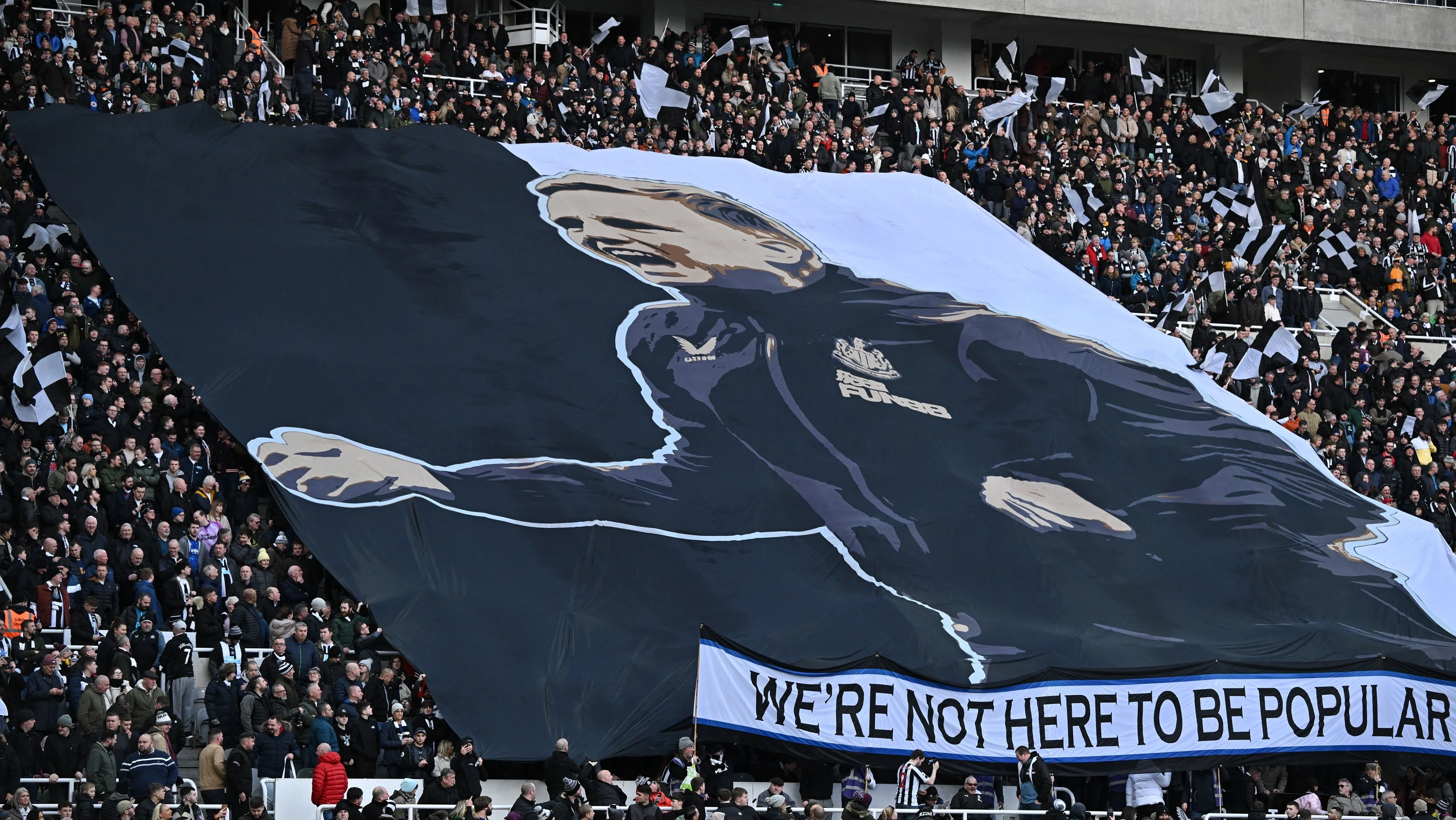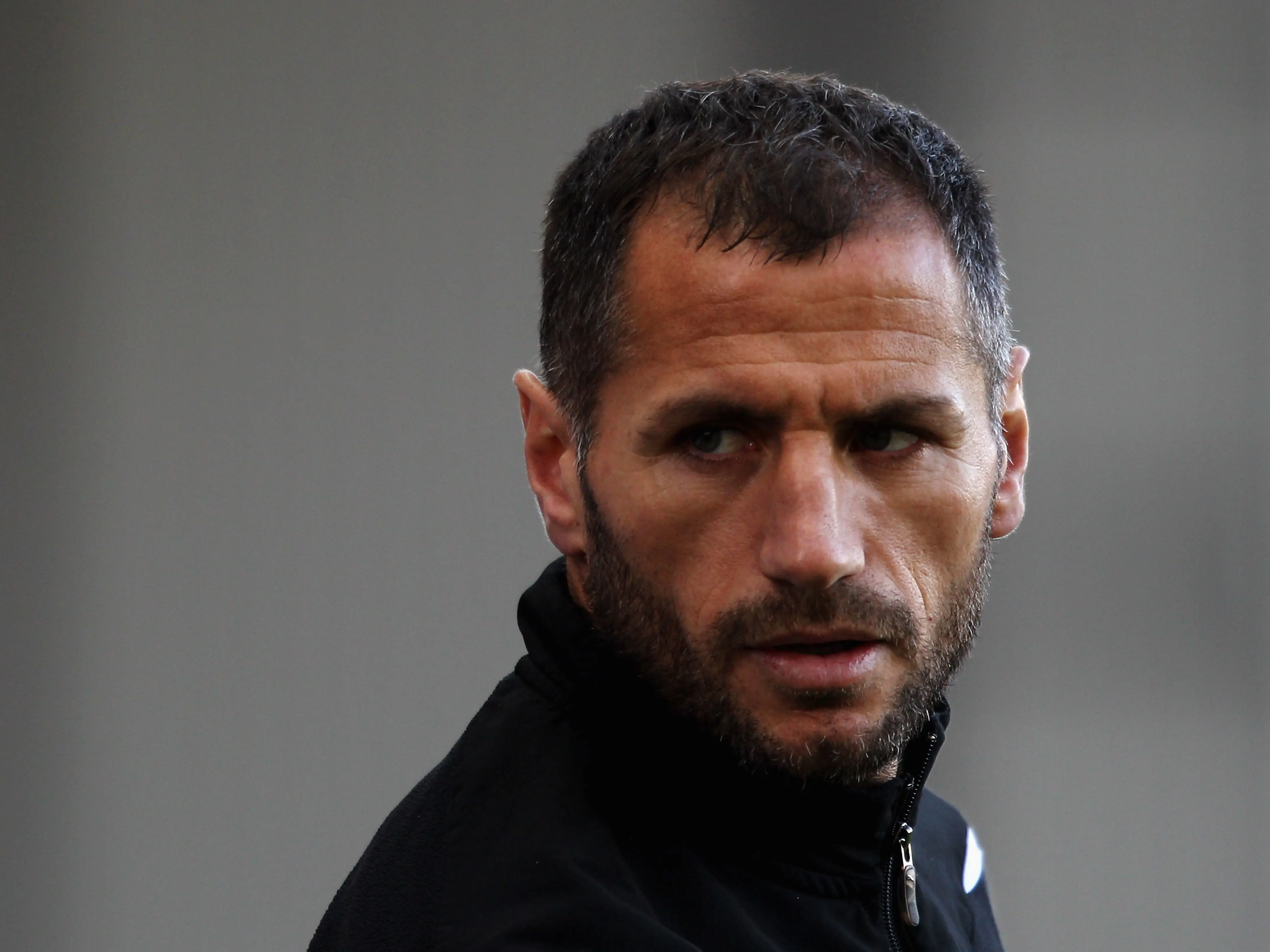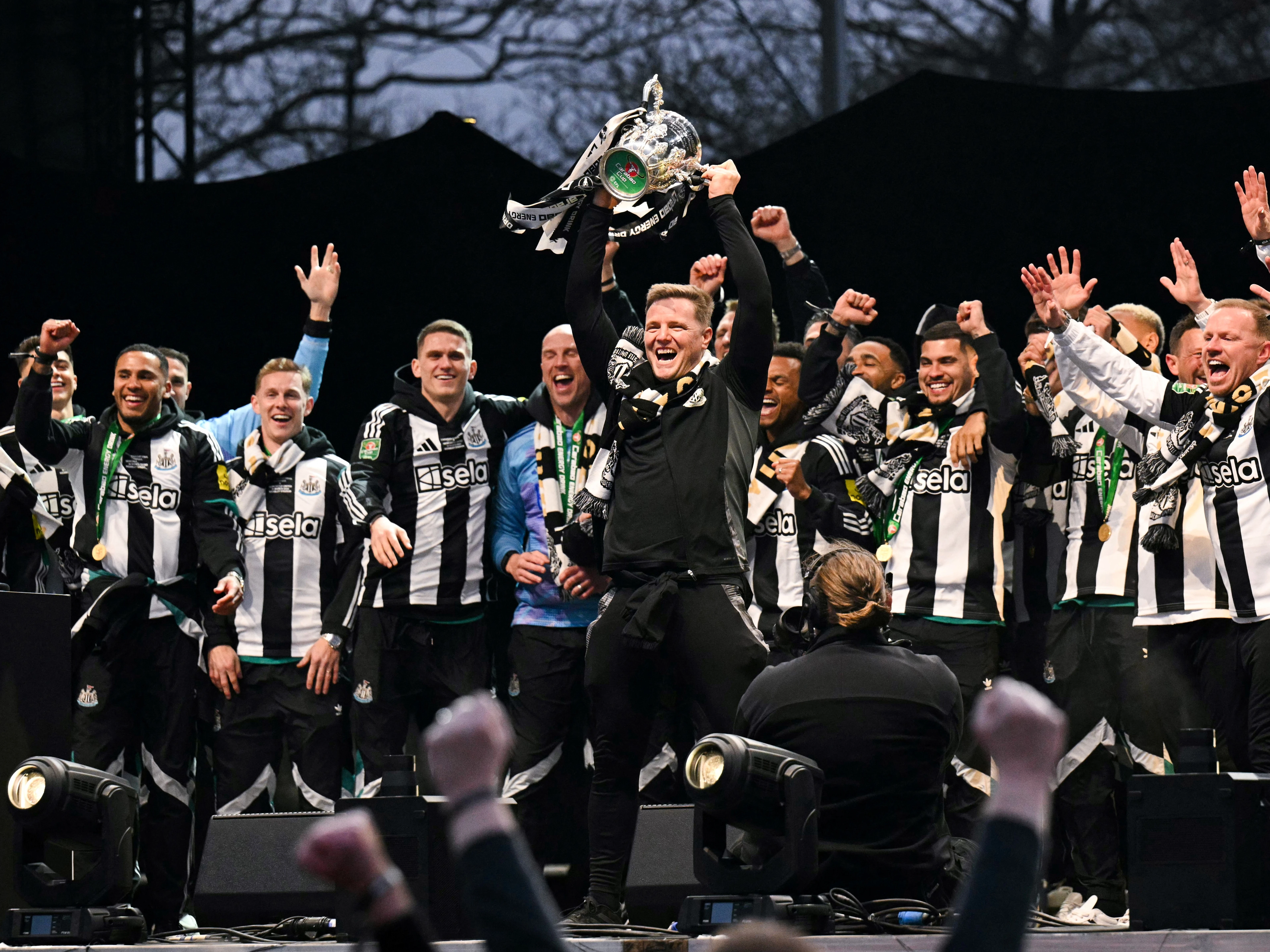Two large blinds behind Howe's desk conceal a view across the training pitches. It is a spacious room – sofas form a breakout area to his right – and given there may be, at times, a few tricky conversations to be had here, it is not an unwelcoming place. "I wouldn't want it to be seen as somewhere where you wouldn't want players to come – that's not how we want to work," he says. "Don't get me wrong – there'll be times when they're sat in here and they probably don't want to be here. But I'd also like to think that they could knock on the door and speak to me about anything in their lives, if they need help, or just talk to me about them as people and how their life is.
"The whole job is about relationships. For me, for a player to be able to give his best on the pitch, they have to be in a good space off the pitch. We're very interested in the players' lives and making sure they're happy, comfortable and have everything they need. I do believe in communication to ward off any future trouble. I think healthy communication is such a powerful thing."
Today is a day off for the players but outside the car park is full. Four of them – three of whom were involved in the win over Southampton under 48 hours previously – have already been into the restaurant for their breakfast, and more will follow. They don't really need to be here but this is Howe's Newcastle now; there is work to be done, and his ethos has spread by osmosis through his squad.
He has been in for two hours already. Howe first sat down with UNITED in November 2021, a week after his appointment, when curiosity about his working hours led to a strange surge in coverage. Cameras at the gates captured his early starts and late departures from the club's Benton base. It was all a bit odd. He smiles. "That's what I've always done. I wasn't trying to show anything. That's just what I do," adds the 45-year-old. "I feel I need to get in early to give myself the best chance to be prepared, to give the players the best day possible, to lead to – hopefully – the best chance of us getting a positive result on the weekend. I devote a lot of time to job, but only because I want to be the best me I can be.
"It's all about me trying to give the best product to the players. I'm always thinking of what they need, rather than anything else."
A by-product of the interest in his movements then was the signal it sent out: we're here to work. "That's the least that the people of Newcastle, and everyone that's given me this opportunity, deserve – that I repay them with the best effort I can give. That's always been my pledge to whoever has employed me, really. I'll work as much as I can to bring success. I have to look myself in the mirror and know I've given everything I can."
What constitutes success is fodder for a never-ending debate but for those inside St. James' Park, the last 18 months have been transformational. Howe has led the rebuild, conjuring excellence from new signings and coaxing it from those he inherited. I ask where Howe the player – a centre half of great promise and an England Under-21 international – might have fitted in to the squad he has assembled.
"I'd probably still have been some way short of where I needed to be, to be honest," he replies. "The two eras are incomparable. I'm putting myself in a different era here – that makes me sound old – but it's true. Everything is so different now to when I was playing. The players here are well looked after, they have good facilities, but they're a really, really professional group, and very, very talented. We've got some incredible players within the squad. I'd have given my best to stay with them, but probably come up a little bit short."
It has been 27 years since he made his debut for Bournemouth in December 1995. Some things change and some don't but those days still inform dealings he has as a manager. "There's still so much that's relevant. The core principles of being a footballer haven't changed. The emotions that the players feel – I still feel I can relate to the highs, the lows, the good bits, the bad bits.
"As coaches we always try to put ourselves in the shoes of the player whenever we're making a decision or choosing what route to take. I don't think the levels are comparable either. But emotions are the key thing – it's trying to always understand how the players feel, what they need, and what's best for us to decide as we navigate our way through a season."
There was no real time, in Howe's playing days, to consider these matters at length and a player's inherent single-mindedness usually prohibits it anyway. "You have to remember the players are under a lot of scrutiny, a lot of pressure to perform, so they have to have that selfish streak where they're trying to tune themselves in to be at their best at the weekend. I don't think there's any other way for them to be and I have to say, for all those things players are feeling, the group this year have been incredible with each other. They've fostered a brilliant team spirit which I think you can see on the pitch when you watch us play."
Several members of the Magpies' first team have spoken about how that collective spirit has permeated this most thrilling of seasons. There is a degree of alchemy in its creation – "it can be loads of little things, like things in their daily training routines that maybe they won't even think about" – but ultimately it is in the players' hands, at the whim of the characters in the group. "That comes full circle back to recruitment and the players you bring into the group. It's so important. I don't underestimate any part that can affect the balance of the squad."
Howe dreamed of playing for his country, of playing in the Premier League. In 2002 he left the Cherries and joined First Division Portsmouth as Harry Redknapp reconfigured his squad with an eye on promotion. "I worked really hard, I felt, to get to where I was. I wasn't blessed with a huge amount of natural talent. It was a lot of work to get to where I got to. I managed to get a move to Portsmouth on the back of a really intense period where I'd given everything to try and improve as a player."
His debut at Preston was curtailed by injury and his second outing, against Nottingham Forest on the opening day of the 2003/04 season, was catastrophic; he dislocated his kneecap, chipped some bone underneath it and ended up with a chondral defect. It kept him out for two years.
"I realised that was going to have a terminal effect on my career, really, and a detrimental effect long-term. My dreams and everything kind of flashed by and were gone," he recalls. "It was a big sinking feeling. It was a huge period where I had to be really strong mentally because my only focus had been to try and get to the top, and I then realised that I wasn't going to get there. But I try and keep everything in context, and that was really important. Yes, your playing career isn't going to be what you wanted it to be, but to know you still had the love and support of your family around you, you were fit and healthy apart from your knee… to try and see the positives in the negative, is I suppose what I'm trying to say. That's what I tried to do even though I knew my dreams weren't going to materialise."
He had to recalibrate his hopes of what football might look like for him. "And that's painful to do," he nods. "Then it became about, 'can I stay in the game? Can I keep playing? Can I stay a professional footballer for as long as possible?' Within a year to two years, my aims had gone from (reaching the Premier League and international recognition) to the second part. But that's not an easy thing to do, to reset your goals that dramatically."
The experience, and the trauma, helped Howe learn to stay in the 'now', to remain level, and it shows in his unwillingness to discuss what next season might look like for Newcastle. He is not the performative type anyway; before February's Carabao Cup final he made a point of saying that he wouldn't be getting tangled in his thoughts or caught up in the feeling. He wouldn't be "going there".
What does "going there" mean? And where is 'there'? "'Going there', for me, means probably going back to childhood, to all the reasons why you do the job, to the highs and lows you've had in your career, to going deeper on an emotional level. You can only do that really in the confines of your own house," he says, with a laugh. "You're here to do a job – to try and win. The most important people are the players, and you've got to try and help them. To help them, you have to think logically, you have to think smartly. To be actually emotional in those moments, sometimes, is very negative."
Senses are heightened on matchday. "Your work is being judged. You're with your supporters, your players, it's highly emotive. There's so much going on. But I feel the manager's job is to drown all that out and focus on how we can win the game. Then you face the media straight away so you're bombarded with a series of questions and whether it's good or bad, you have to control what you say, because your message is important for the supporters to take. And then you go home," he exhales, "and you reflect on everything that's happened. You rarely get a chance to actually get away from those processes."
Going there can wait for now. Among many tasks Howe must juggle is the need to gradually shift the club's psyche. Finals, like the one against Manchester United a few months ago, must become regular events and days of real glory rather than just glorious occasions. "I think the only way you can change mentalities and mindsets is to be consistent with your message and your work. Around the cup final with the players, it was a case of sticking to the basics. We weren't looking at it as, 'haven't we done amazingly to get to the cup final?' We were looking at it as almost like we expected to be there, and that's how I wanted the players to approach it. If you build up that one game too much, it can have a negative effect on performance. We want this to be the norm."
He continues. "In some senses it's very difficult to achieve. There's a very fine balance between everything you do, and how you convey your message to players and the media. Long term, that's where we want the club to be, competing in all major cup competitions. But that's not underestimating the challenge to get there, from where we've come from. It's incredibly difficult, and what we've done this season deserves I think a huge amount of credit to the players and staff.
"When you're the manager there's only one of you. You have a squad of 25, 30 players and a lot of staff to help as well. It's a big demand on us to produce a really good product for the players and I'm very much in the hands of my coaching team to help me with that process. I'll go to Jason (Tindall), Graeme (Jones), Stephen (Purches), Simon (Weatherstone), Mark (Leyland), Dan (Hodges), Shwan (Jalal), Adam (Bartlett) – they've been hugely important for me this year. They've performed exceptionally well, worked incredibly hard and been really diligent. I'm sure the players recognise their efforts as well in terms of what they've produced for them. It's a team effort."
Howe passed the 250-game mark as a Premier League manager last weekend. Those kind of milestones register less now than they did as a player. Perhaps it will be a source of pride one day. In the present, it has been some nine months and it will end, whatever happens in the next three weeks, with a top seven finish. It may well get even better for this new Newcastle. The first challenge was staying up in 2022 and the second was to nurture stability, to build, to improve. "I think we've done that, and then some," says Howe, before getting back to work. There is still a lot to do.
"Now, the challenge becomes so much harder. The better you get, the harder it is to get better – that's a phrase I love, and I agree with it. From this stage last year to now, we've really improved a lot of aspects of the team, and now to find more is going to be a real challenge. But we have to. The Premier League will only get stronger."




